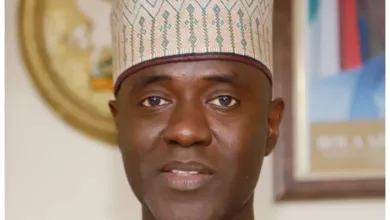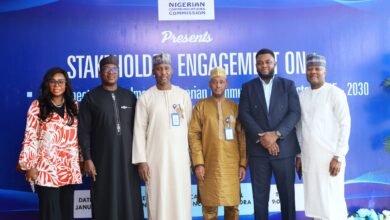Technology
EPISODE 36: Telecoms: What’s in the News Today

- NCC’s Dr. Aminu Maida urges stronger broadband investment and infrastructure protection.
- Nigeria’s penetration hits 48.81%, with huge GDP growth potential.
- Globacom supports NCC’s broadband roundtable on Right of Way.
- Airtel & Eutelsat OneWeb test LEO satellites to expand high-speed internet to remote areas.
Urgent Call to Enhance Broadband Investment and Security in Nigeria
Dr. Aminu Maida, Executive Vice Chairman of the Nigerian Communications Commission (NCC), has called for renewed commitment to broadband investment and infrastructure protection, emphasizing that broadband is both an economic catalyst and a national security asset.
Speaking at a high-level Business Roundtable in Abuja on “Improving Investments in Broadband Connectivity and Safeguarding Critical National Infrastructure,” Dr. Maida highlighted broadband as “the quiet enabler of productivity, innovation, and security.” He cautioned that disruptions to connectivity could stall productivity and even endanger lives, stating, “When connectivity fails, opportunities evaporate, productivity stalls—and in critical situations, lives can be put at risk.”
Nigeria’s broadband penetration currently stands at 48.81%, connecting more than 140 million citizens. Dr. Maida reaffirmed that expanding broadband coverage is vital for economic growth, noting that a 10% increase in broadband penetration could raise Nigeria’s GDP by up to 1.38%.
This effort aligns with the objectives of the National Broadband Plan (2020–2025), which targets 70% broadband penetration and the deployment of 90,000 kilometers of fiber optic infrastructure by 2025. However, the sector continues to face serious operational challenges, including 19,384 fiber cuts, 3,241 equipment theft incidents, and over 19,000 cases of denied access to telecom sites recorded between January and August 2025.
Dr. Maida’s address underscored the urgency of protecting critical infrastructure and called for stronger partnerships among government agencies, telecom operators, and security institutions to ensure uninterrupted connectivity, economic stability, and national resilience.
NCC’s Dr. Maida Urges Unified Action for Nigeria’s Digital Future
At the same roundtable, Dr. Maida issued a clarion call for unified national action to eliminate barriers to broadband expansion, stressing that Nigeria’s digital transformation depends on coordinated effort across all levels of government.
He posed a striking question to participants: “How much is an hour of connectivity worth?”—a reminder of the economic and social costs of digital exclusion. He warned, “The digital revolution will not wait. Either we align, or we’ll be left behind.”
Dr. Maida emphasized that connectivity lies at the heart of commerce, education, security, and governance. “From tech entrepreneurs in Lagos to geologists in Zamfara,” he said, “connectivity is essential. In today’s world, a community without digital access is invisible—it is cut off from healthcare, markets, education, and opportunity.”
His remarks served as both a wake-up call and a roadmap, urging collaboration among stakeholders to overcome infrastructural and regulatory challenges, integrate Nigeria’s youth into the digital economy, and secure the nation’s digital future.
Globacom Champions Broadband Expansion at NCC Business Roundtable
Nigeria’s digital economy agenda gained momentum on Wednesday as Globacom, one of the country’s leading telecommunications operators, reaffirmed its commitment to broadband expansion by supporting the NCC’s Business Roundtable on “Right of Way and Protection of Broadband Infrastructure – The Road to Success in Broadband Investment and Connectivity.”
Held at the NCC headquarters in Abuja, the two-day forum brought together stakeholders from the federal and state governments, the private sector, regulatory agencies, and telecom operators to harmonize strategies for improving broadband penetration and safeguarding telecom infrastructure.
Globacom’s sponsorship and active participation underscore its pivotal role in advancing Nigeria’s connectivity objectives. The company provided logistical and technical support to ensure the event’s success, reaffirming its dedication to delivering fast, reliable, and inclusive digital connectivity nationwide.
Industry experts view the roundtable as a vital platform for aligning government and private sector efforts—particularly in resolving Right of Way (RoW) bottlenecks, strengthening coordination, and accelerating broadband deployment in underserved areas. This collaboration represents a major step toward realizing Nigeria’s national digital goals and expanding access to digital opportunities for all citizens.
Airtel Africa and Eutelsat OneWeb Achieve Breakthrough in LEO Satellite Connectivity
Airtel Africa and Eutelsat OneWeb have successfully completed a landmark trial of low-earth orbit (LEO) satellite connectivity in sub-Saharan Africa, marking a significant milestone in extending reliable, high-speed internet to remote and hard-to-reach areas.
The test achieved download speeds of up to 100 Mbps and upload speeds of 20 Mbps, even across forested and geographically challenging terrains. Connectivity remained stable with low latency throughout the test journey between key urban centers.
This breakthrough demonstrates the viability of LEO technology in supporting real-time monitoring, predictive maintenance, and emergency response systems, while enabling new consumer services such as onboard Wi-Fi, live streaming, and e-ticketing.
Luc Serviant, Group Enterprise Director at Airtel Africa, hailed the trial as a “historic breakthrough” that demonstrates satellite technology’s potential to close Africa’s connectivity gaps. The pilot is part of Airtel’s “Satellite for Business” initiative, which aims to extend coverage to countries such as Nigeria, Zambia, Gabon, Madagascar, and the Democratic Republic of Congo, targeting communities that have long remained beyond the reach of conventional broadband infrastructure.
This milestone not only highlights Africa’s growing embrace of advanced connectivity solutions but also underscores the transformative role of satellite technology in achieving universal access across the continent.




